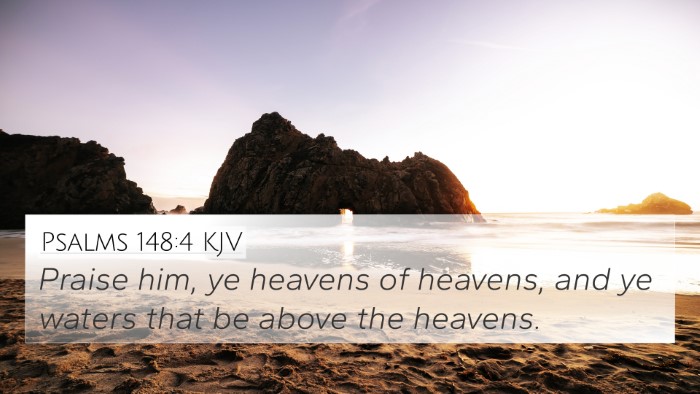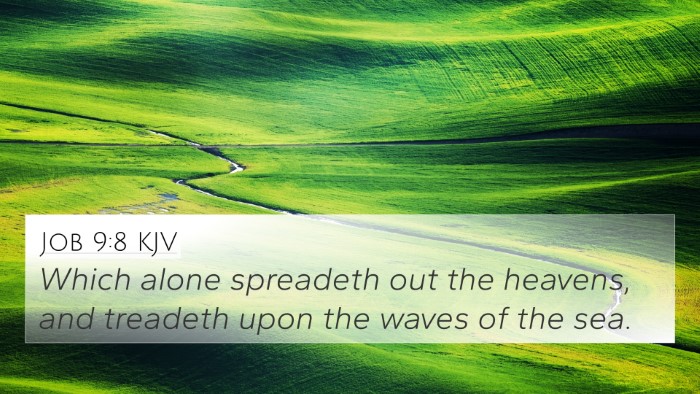Old Testament
Genesis Exodus Leviticus Numbers Deuteronomy Joshua Judges Ruth 1 Samuel 2 Samuel 1 Kings 2 Kings 1 Chronicles 2 Chronicles Ezra Nehemiah Esther Job Psalms Proverbs Ecclesiastes Song of Solomon Isaiah Jeremiah Lamentations Ezekiel Daniel Hosea Joel Amos Obadiah Jonah Micah Nahum Habakkuk Zephaniah Haggai Zechariah MalachiJob 37:18 Similar Verses
Job 37:18 Cross References
Hast thou with him spread out the sky, which is strong, and as a molten looking glass?
Uncover the Rich Themes and Topics of This Bible Verse
Listed below are the Bible themes associated with Job 37:18. We invite you to explore each theme to gain deeper insights into the Scriptures.
Job 37:18 Cross Reference Verses
This section features a detailed cross-reference designed to enrich your understanding of the Scriptures. Below, you will find carefully selected verses that echo the themes and teachings related to Job 37:18 KJV. Click on any image to explore detailed analyses of related Bible verses and uncover deeper theological insights.
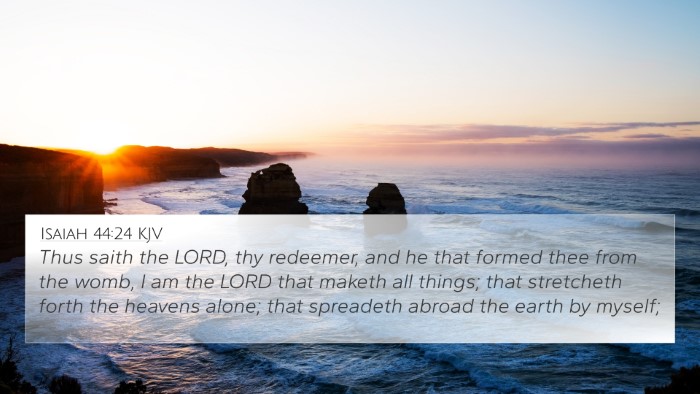
Isaiah 44:24 (KJV) »
Thus saith the LORD, thy redeemer, and he that formed thee from the womb, I am the LORD that maketh all things; that stretcheth forth the heavens alone; that spreadeth abroad the earth by myself;
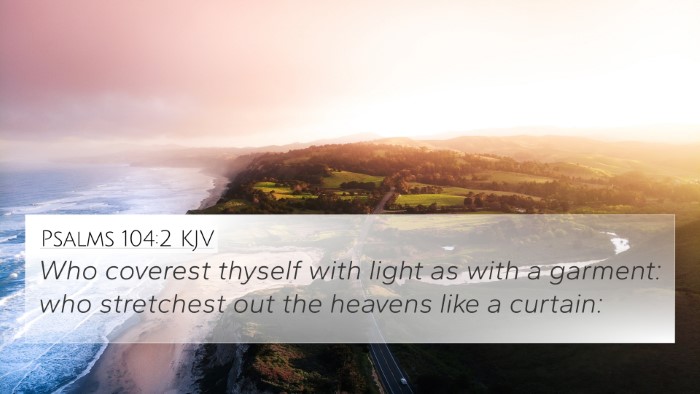
Psalms 104:2 (KJV) »
Who coverest thyself with light as with a garment: who stretchest out the heavens like a curtain:
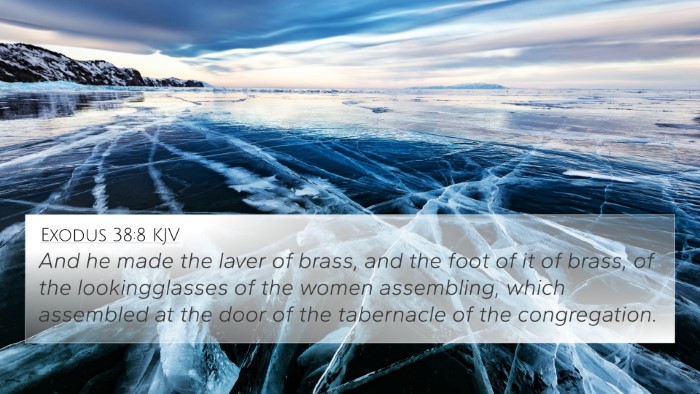
Exodus 38:8 (KJV) »
And he made the laver of brass, and the foot of it of brass, of the lookingglasses of the women assembling, which assembled at the door of the tabernacle of the congregation.
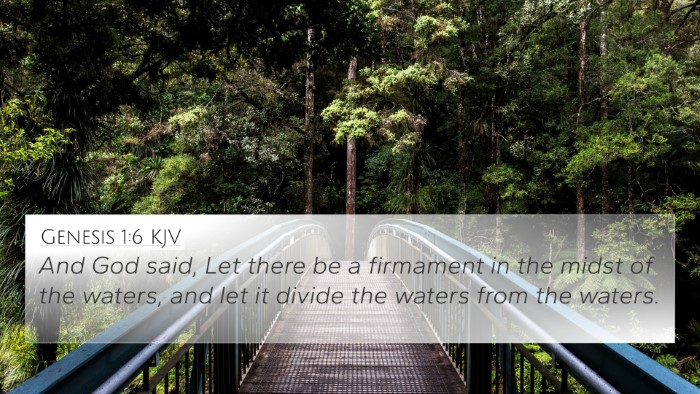
Genesis 1:6 (KJV) »
And God said, Let there be a firmament in the midst of the waters, and let it divide the waters from the waters.
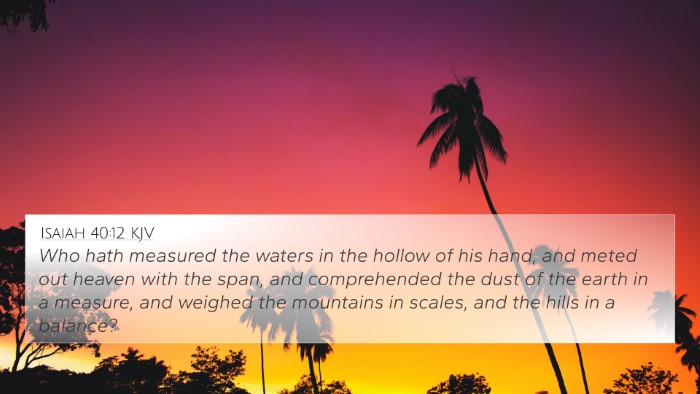
Isaiah 40:12 (KJV) »
Who hath measured the waters in the hollow of his hand, and meted out heaven with the span, and comprehended the dust of the earth in a measure, and weighed the mountains in scales, and the hills in a balance?
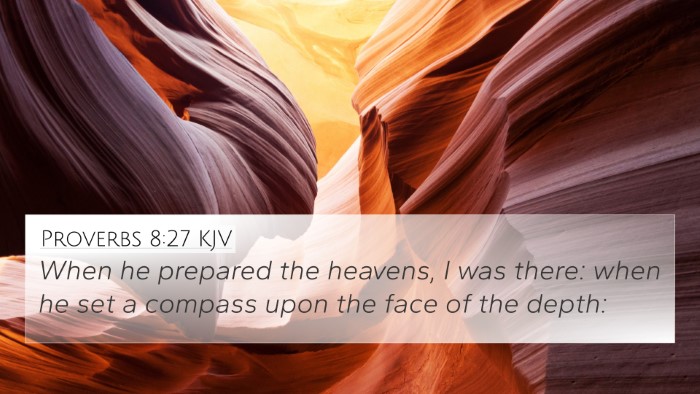
Proverbs 8:27 (KJV) »
When he prepared the heavens, I was there: when he set a compass upon the face of the depth:
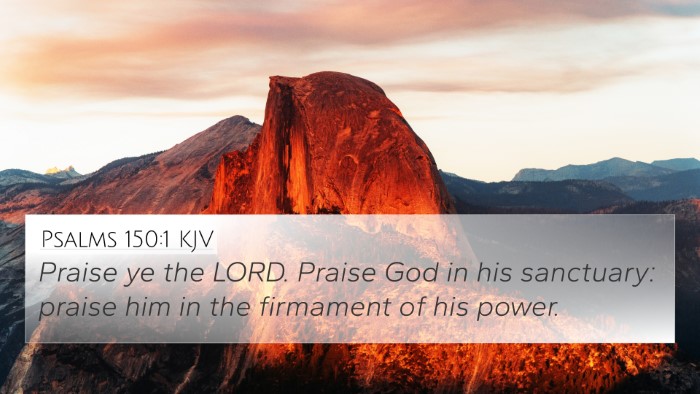
Psalms 150:1 (KJV) »
Praise ye the LORD. Praise God in his sanctuary: praise him in the firmament of his power.
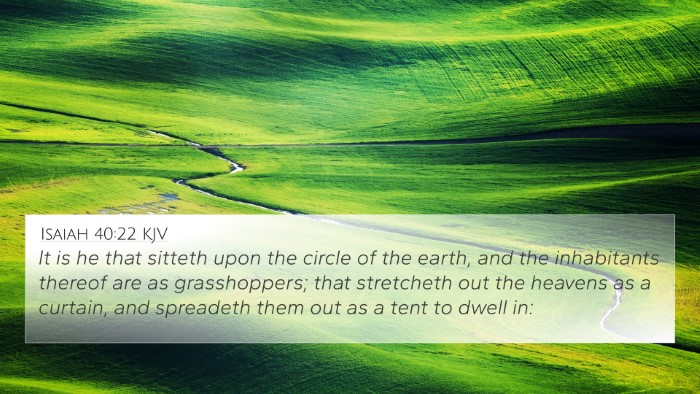
Isaiah 40:22 (KJV) »
It is he that sitteth upon the circle of the earth, and the inhabitants thereof are as grasshoppers; that stretcheth out the heavens as a curtain, and spreadeth them out as a tent to dwell in:
Job 37:18 Verse Analysis and Similar Verses
Understanding Job 37:18
The verse Job 37:18 states: "Hast thou with him spread out the sky, which is strong, and as a molten looking glass?" This verse presents a significant reflection on the majesty of God as demonstrated in creation, particularly in the context of His control over nature and His grandeur.
Verse Meaning and Insights
Job 37:18, situated within a discourse by Elihu about the nature of God’s power and majesty, serves to remind the reader of the strength and wonder of creation. The sky is poetically described as a "molten looking glass," suggesting a display of brilliance and splendor. This imagery emphasizes not only the beauty of the heavens but also God's authority in shaping the world around us.
- God's Sovereignty: The verse reflects the overarching theme of God's sovereignty over creation, a concept echoed throughout scripture.
- Divine Wisdom: The verse invites contemplation on the wisdom of God in creating the universe as both grand and finely crafted.
- Human Limitation: By questioning Job if he has any role in this creation, it highlights the limitations of human understanding compared to the wisdom of God.
- Natural Revelation: The sky and its beauty are illustrations of God's revelation to humanity through His creations.
Cross References
The following verses provide additional context and connections to Job 37:18, highlighting themes of God's sovereignty and the beauty of creation:
- Genesis 1:1: "In the beginning God created the heaven and the earth," confirming God's role as the Creator.
- Psalms 19:1: "The heavens declare the glory of God; and the firmament sheweth his handywork," relating the physical sky to God's magnificence.
- Isaiah 40:22: "It is he that sitteth upon the circle of the earth," which expresses God's majesty and control over the universe.
- Job 9:8: "Which alone spreadeth out the heavens, and treadeth upon the waves of the sea," illustrating God’s control over the natural elements.
- Ecclesiastes 3:11: "He hath made every thing beautiful in his time," showing God's intentional design and beauty in creation.
- Romans 1:20: "For the invisible things of him from the creation of the world are clearly seen," emphasizing how nature reveals God's attributes.
- Revelation 4:11: "Thou art worthy, O Lord, to receive glory and honor and power; for thou hast created all things," pointing to God's ultimate authority as Creator.
Insights from Commentaries
Matthew Henry's Commentary
Matthew Henry emphasized the power and glory of God as revealed through nature. He pointed out that Job is reminded of the vastness of God's creation, symbolizing that the sky's expanse is a testament to God's immeasurable grandeur.
Albert Barnes' Notes
Albert Barnes elaborates on the metaphor of a "molten looking glass," interpreting it as a reflection on the beauty and seamless nature of the sky. He highlights this metaphor to show how the heavens serve as a mirror reflecting God’s power and artistry to mankind.
Adam Clarke's Commentary
Adam Clarke provides an interpretation that emphasizes both God's power and His creativity. He suggests that the beauty of the sky not only brings admiration but also invokes a sense of humility in human beings, understanding their place in the grand scheme of creation.
Thematic Connections
This verse can be connected thematically to several concepts within the scriptures:
- Creation and Worship: The splendor of creation instills awe and leads to worship, evident in Psalms and Revelation.
- God's Omnipotence: God's unmatched power is a frequent theme across both Testaments, as highlighted in Job and the writings of the Apostles.
- Nature as Revelation: The verses indicate that observing nature fosters a deeper understanding of God’s nature.
Conclusion
Job 37:18 encapsulates profound teachings regarding God's power and artistry in creation. By understanding this verse within its context and through the insights of various commentaries, readers can gain a deeper appreciation for the majesty of God as reflected in the natural world. This verse also encourages believers to acknowledge their position in relation to God's greatness and the awe-inspiring works of His hands.



